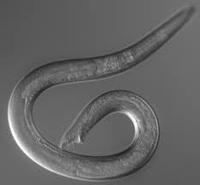
Macro-level modeling of the response of C. elegans reproduction to chronic heat stress
Abstract
A major goal of systems biology is to understand how organism-level behavior arises from a myriad of molecular interactions. Often this involves complex sets of rules describing interactions among a large number of components. As an alternative, we have developed a simple, macro-level model to describe how chronic temperature stress affects reproduction in C. elegans. Our approach uses fundamental engineering principles, together with a limited set of experimentally derived facts, and provides quantitatively accurate predictions of performance under a range of physiologically relevant conditions. We generated detailed time-resolved experimental data to evaluate the ability of our model to describe the dynamics of C. elegans reproduction. We find considerable heterogeneity in responses of individual animals to heat stress, which can be understood as modulation of a few processes and may represent a strategy for coping with the ever-changing environment. Our experimental results and model provide quantitative insight into the breakdown of a robust biological system under stress and suggest, surprisingly, that the behavior of complex biological systems may be determined by a small number of key components.